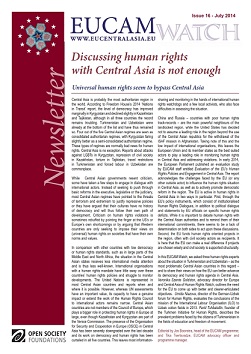Discussing human rights with Central Asia is not enough
Discussing human rights with Central Asia is not enough
Author(s): Jos Boonstra, Tika Tsertsvadze, Veronika Szente Goldston, Umida Niazova, Farid Tuhbatullin
Subject(s): Gender Studies, Human Rights and Humanitarian Law, Government/Political systems, Politics and law, Politics and society, Social development, Sociology of Politics, Sociology of Law
Published by: CEPS Centre for European Policy Studies
Keywords: Central Asia; human rights; authoritarian regime; democracy; LGBT population; Kazakhstan; Tajikistan; Turkmenistan; Uzbekistan;
Summary/Abstract: Central Asia is probably the most authoritarian region in the world. According to Freedom House’s 2014 ‘Nations in Transit’ report, the level of democracy has improved marginally in Kyrgyzstan and declined slightly in Kazakhstan and Tajikistan, although in all three countries the record remains troubling. Turkmenistan and Uzbekistan were already at the bottom of the list and have thus remained so. Four out of the five Central Asian regimes are seen as consolidated authoritarian regimes, with Kyrgyzstan faring slightly better as a semi-consolidated authoritarian regime. These types of regimes are normally bad news for human rights. Central Asia is no exception. Reports about attacks against LGBTs in Kyrgyzstan, repression of civil society in Kazakhstan, torture in Tajikistan, travel restrictions in Turkmenistan and forced labour in Uzbekistan are commonplace.
Series: EUCAM Watch
- Page Count: 6
- Publication Year: 2014
- Language: English
- Content File-PDF

